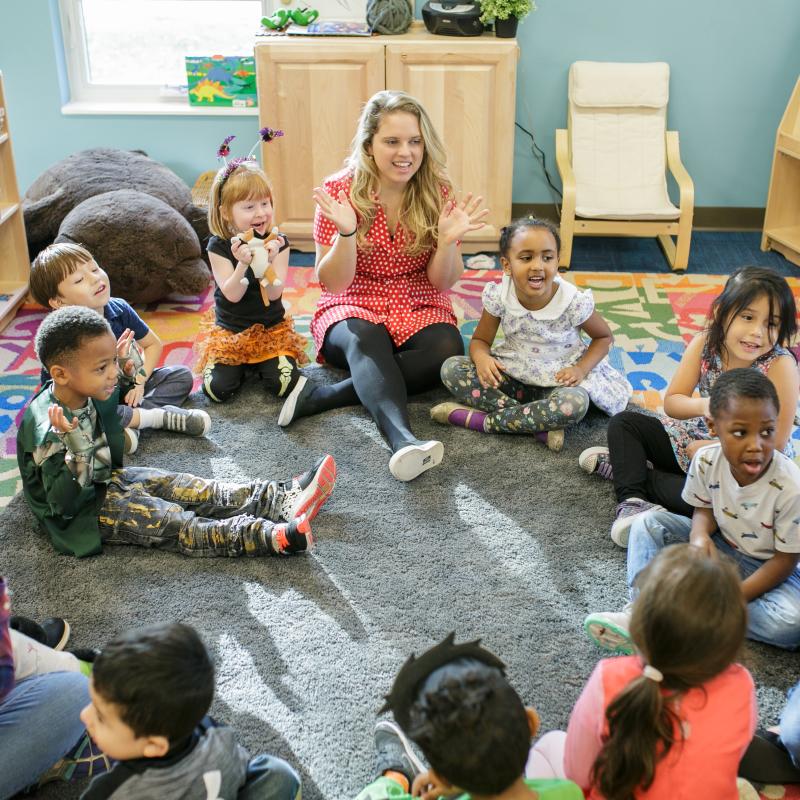When it comes to picking a preschool, parents today are under a lot of pressure to pick the “right” program. It’s easy to get dazzled by glossy facilities, add-ons, and early academics. But decades of research, and what we see every day at St. David’s ECE program, prove that the real markers of quality are relationships, regulation, play, and inclusion. Here’s a quick, research-aligned guide you can bring on your tour.
The Big Picture
- Readiness starts with relationships. Children learn best when they feel safe, seen, and connected.
- Play is the engine of learning. Active, child-led play builds language, attention, problem-solving, and social skills.
- Inclusion benefits everyone. Mixed-ability classrooms grow empathy, flexibility, and cooperation.
On a Walk-Through, Notice…
- Emotionally attuned adults. Do teachers kneel to children’s eye level, name feelings, and coach problem-solving instead of shaming or punishing?
- Joyful noise and movement. Are kids talking, negotiating, building, and exploring, rather than sitting silently for long stretches?
- Predictable, visual routines. Schedules with pictures, calm transitions, and clearly-articulated expectations support regulation and attention.
- Real accommodations for all learners. Wiggle seats, chewies, quiet corners, noise-reducing headphones, and flexible seating signal genuine inclusion.
- Back-and-forth conversation. Teachers narrate, ask open questions, and wait for children’s ideas—fuel for language and thinking.
- Teacher well-being. Do staff look supported and steady? Smiles matter, but so do planning time, small group sizes, and backup coverage.
Green Flags
- Teachers calmly co-regulate (“Borrow my calm”), then help children name feelings and choose tools.
- Peer helping is noticed and named (“You saw your friend was sad and brought a book—how kind”).
- Daily rhythms feel steady: arrive → play → snack → outside → small-group time → rest → play.
- Nature-forward or sensory-wise spaces: soft light, natural materials, cozy nooks, outdoor play every day.
- Documentation highlights process (“we tried… we noticed… we wondered…”) rather than perfect products.
Red Flags
- Reliance on worksheets or long circle times as “kindergarten prep.”
- “Three strikes” behavior policies or language like “not a good fit” in lieu of supports for children of different abilities.
- Kids mostly lined up, waiting, or being told to be “good” without guidance.
- High staff turnover with no plan to stabilize or mentor new teachers.
- Communication that feels one-way, corrective, or perfectionistic.
Why This Matters
Strong social-emotional foundations—attention, cooperation, emotion regulation—are tied to better learning, graduation rates, relationships, and long-term well-being. Programs that center relationships and inclusion set children up not just to start school, but to love learning.
How St. David’s Puts This Into Practice
- Culture: “We take care of each other” and “We solve problems together.”
- Strategies: Emotional coaching, outdoor spaces and natural light, calm-down spaces, reciprocal conversation games and other strategies, and teacher reflection time, for example, on the “parallel process” (how teachers’ regulation shapes children’s).
- Supports: Integrated therapy consults, inclusive design, and staff training that sustains patience, joy, and presence.
St. David’s ECE Enrollment opens on January 6, 2026, with the greatest availability in our toddler classrooms. Interested in learning more? Visit our Early Childhood Education Page today!
